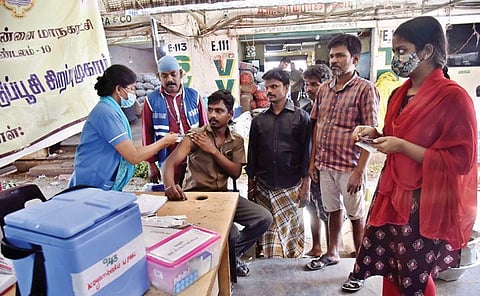

NEW DELHI: India was able to save over 3.4 million lives by undertaking a nationwide Covid-19 vaccination campaign at an unprecedented scale, said a Stanford University working paper released on Friday.
The Covid vaccination campaign also yielded a positive economic impact by preventing a loss of USD 18.3 billion, the working paper by Stanford University and Institute for Competitiveness titled ‘Healing the Economy: Estimating the Economic Impact on India’s vaccination and related issues’ said. The paper was released by Union Health Minister Mansukh Mandaviya.
The paper discussed the role of containment as a measure to prevent the spread and mentioned some examples like ‘Bhilwara’, ‘Dharavi’, and ‘Kerala’ “as a reference point of successful containment strategy.” The paper elaborated on the three cornerstones of India’s strategy- containment, relief package and vaccine administration – which it said were critical in saving lives and ensuring economic activity by containing the spread of Covid-19, sustaining livelihoods and developing immunity against the virus.
“Containment brought about envisaged gains with a bottom-up approach contrary to the counterfactual top-down approach,” it said. It said that containment worked as a double-edged sword since it not only ensured some economic activity but also reduced the burden on health infrastructure.
“The initial lockdown helped India ‘flatten the curve’ and buy essential time in revamping the health infrastructure. This was complemented with a localized containment strategy,” it said. It stressed that containment was not just limited to restricting the spread of the virus, but to the whole set of measures required to strike a balance between lives and livelihoods.
Virtually addressing the ‘The India Dialog’ session on the Economic Impact of Vaccination and Related Matters, Mandaviya hailed the early decision of lockdown by Prime Minister Narendra Modi as a significant turning point.
He said it enabled the government to leverage community response in its five-pronged strategy namely Test, Track, Treat, Vaccination, and Adherence for implementing Covid Appropriate Behaviour and delivering a rapid and robust response to combat Covid.
He said that the government focused on augmenting health infrastructure in terms of Covid-related beds, drugs, and logistics i.e., N-95 masks, PPE kits and medical oxygen, simultaneously up-skilling human resources through Centres of Excellences and deploying digital solutions such as eSanjeevani Telemedicine service, Aarogya Setu, Covid-19 India Portal etc. The event was organised by the Institute for Competitiveness and US-Asia Technology Management Center, Stanford University.
Covid: The Turning Point
Three cornerstones of India’s strategy: Containment, Relief Package and Vaccine Administration:
The Stanford University working paper elaborated on the 3 pillars of India’s strategy
The five-pronged strategy of government – namely Test, Track, Treat, Vaccination, Adherence – proved key, said the minister
India’s was world’s biggest vaccination drive
Close to 98 per cent of adult population received one shot of Covid vaccine
90 per received two doses
2.2 billion dosages administered